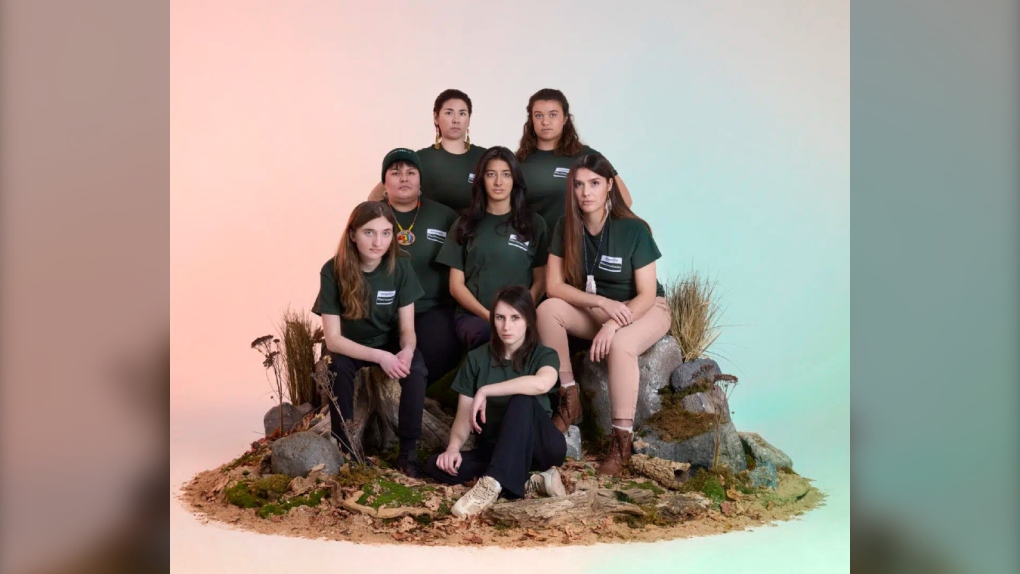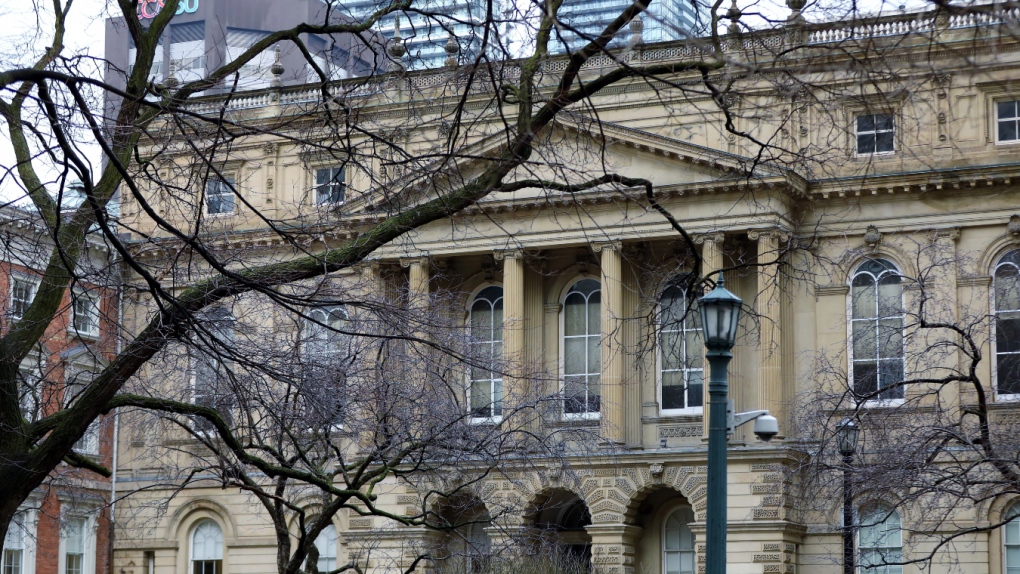Ontario's top court orders new hearing for youth-led climate case
Ontario's top court breathed new life into a Charter challenge of the provincial government's emissions target on Thursday, a decision heralded as a major victory for the group of young people -- including 17-year-old Sophia Mathur from Greater Sudbury -- who brought the case and others looking to hold governments to account on climate change.
 The group of seven young people who brought the Mathur v. Ontario case in order to hold the Ontario government to account on climate change. (Tilly Nelson/EcoJustice)
The group of seven young people who brought the Mathur v. Ontario case in order to hold the Ontario government to account on climate change. (Tilly Nelson/EcoJustice)
The Ontario Court of Appeal's ruling sends the case back to the lower court for a new hearing and revives the possibility that Ontario's weakened emissions target may still be found unconstitutional.
"The issues raised on the application must be considered afresh and through the correct analytical lens," Thursday's decision said, while poking holes in the lower court judge's original ruling.
The Appeal Court stopped short of making its own decision on the target's constitutionality or ordering the province to instead replace it with a "science-based" target, as the group had sought.
The Mathur v. Ontario case, named after lead applicant from northern Ontario, is the first case to be tried in Canada that considers whether a government's climate-change approach has the potential to violate the Charter of Rights and Freedoms.
‘They work for us’
Mathur says although she and other youth can't yet vote, politicians need to be reminded "that they work for us."
"I believe that our case can make a real difference for young people in Canada and put Ontario back on track to take real climate action and start working for a safer future," she said during a virtual news conference Thursday.
"Our win today shows that our voices and concerns matter."
 Greater Sudbury teen climate activist Sophia Mathur speaks during a virtual press conference on October 17, 2024, following the Ontario Court of Appeal's ruling that a lower court must re-examine if Ontario's weakened emissions target has the potential to violate the Charter of Rights and Freedoms. (CTV News | Video source: EcoJustice)
Greater Sudbury teen climate activist Sophia Mathur speaks during a virtual press conference on October 17, 2024, following the Ontario Court of Appeal's ruling that a lower court must re-examine if Ontario's weakened emissions target has the potential to violate the Charter of Rights and Freedoms. (CTV News | Video source: EcoJustice)
The youth's case
At stake was an emissions target that Premier Doug Ford's then-newly elected Progressive Conservative government set after it repealed the law underpinning Ontario's cap-and-trade system for lowering emissions.
The government scrapped the system in 2018 and replaced the emissions target in that law -- 37 per cent below 1990 levels by 2030 -- with a new target of 30 per cent below 2005 levels.
The young people brought evidence to suggest the revised target would allow for 30 megatonnes more in annual emissions leading up to 2030, equivalent to the annual emissions of about seven million passenger vehicles or nearly 200 megatonnes from 2018 to 2030.
The lower court ruling
In a decision last year, an Ontario Superior Court justice agreed the gap between how much emissions need to be cut globally and what the provincial plan calls for is "large, unexplained and without any apparent scientific basis."
The court also found that Ontario was increasing the risk of death faced by young people -- citing how climate change fuels forest fires, floods and infectious disease spread, and has a disproportionate impact on Indigenous youth -- by not taking steps to further reduce its emissions.
The ruling noted that to align with international standards, Ontario would need a more stringent target that aims for emissions to be half of what they were in 2005 by 2030.
But the judge disagreed that the province's emissions target amounted to a Charter violation. It wasn't that the province's target increased emissions, but that it allegedly did not do enough to reduce them.
The lower court judge ruled in dismissing the challenge that the applicants were trying to impose a "freestanding" obligation on the province to fight climate change.
Province has volunteered to fight climate change, court rules
The Appeal Court disagreed. Ontario had voluntarily made a statutory commitment to combat climate change, Thursday's ruling said.
"The question is whether the application judge should have considered whether Ontario's alleged failure to comply with its statutory obligation violated the appellants' Charter rights," the decision read.
Provincial lawyers respond
In a written statement reacting to the decision, a spokesperson for Ontario's attorney general touted the province's investments in cleaner steel production and transit expansion.
"We are on track to meet emissions reduction targets and will continue to build on our success by ensuring Ontario remains a global leader," said Jack Fazzari, a press secretary for Attorney General Doug Downey.
The case is part of a wave of challenges in Canada and abroad asking courts to take a more active role in overseeing governments' climate plans.
The top court in the Netherlands ruled in 2019 that the Dutch government had a duty to protect citizens from the potentially devastating effects of climate change. It upheld lower court decisions that ordered the government to further cut emissions.
Case lays a ‘solid foundation’ for future victories, one expert says
Thursday's ruling in Ontario has laid a "solid foundation" for a potential victory in the new hearing, said Stepan Wood, a professor at the University of British Columbia.
"This unanimous decision is a major victory for Canadian children and youth who are seeking to hold governments accountable for their contributions to climate change," Wood, a Canada Research Chair in law, society and sustainability, said in a written reaction to the decision.
 The Ontario Court of Appeal is seen in Toronto, Monday, April 8, 2019. (Colin Perkel/The Canadian Press)
The Ontario Court of Appeal is seen in Toronto, Monday, April 8, 2019. (Colin Perkel/The Canadian Press)
Lawyers in another youth-led Charter challenge were watching closely, too. Their case, which challenges the federal government's overall climate plan, is currently before the Federal Court.
"Today's decision is very significant because it confirms that climate change is causing severe harms in Canada, and that the government can be held to account for its role in causing those harms," said Catherine Boies Parker, a lawyer for the applicants in that case.
This report by The Canadian Press was first published Oct. 17, 2024.
CTVNews.ca Top Stories

Bird flu, measles top 2025 concerns for Canada's chief public health officer
As we enter 2025, Dr. Theresa Tam has her eye on H5N1 bird flu, an emerging virus that had its first human case in Canada this year.
Christmas shooting at Phoenix airport leaves 3 people wounded
Police are investigating a Christmas shooting at Sky Harbor Airport in Phoenix that left three people injured by gunfire.
Azerbaijan observes day of mourning for air crash victims as speculation mount about its cause
Azerbaijan on Thursday observed a nationwide day of mourning for the victims of the plane crash that killed 38 people and left all 29 survivors injured as speculation mounted about a possible cause of the disaster, with some experts saying that the airliner was damaged by Russian air defence fire.
6,000 inmates stage Christmas Day escape from high-security Mozambique prison
At least 6,000 inmates escaped from a high-security prison in Mozambique's capital on Christmas Day after a rebellion, the country's police chief said, as widespread post-election riots and violence continue to engulf the country.
Plush toys recalled due to choking hazard
Health Canada is recalling a series of plush toys due to a choking hazard. Anyone who has purchased an elephant, giraffe, lion, tiger and/or panda plush toy with an attached baby can return them to the place of purchase for a refund.
Donald Trump says he urged Wayne Gretzky to run for prime minister in Christmas visit
U.S. president-elect Donald Trump says he told Canadian hockey legend Wayne Gretzky he should run for prime minister during a Christmas visit but adds that the athlete declined interest in politics.
New York taxi driver hits 6 pedestrians, 3 taken to hospital, police say
A taxicab hit six pedestrians in midtown Manhattan on Wednesday, police said, with three people — including a 9-year-old boy — transported to hospitals for their injuries.
Working Well: Returning to the office can disrupt life. Here are some tips to navigate the changes
Heading into 2025, thousands of workers face an unsettling reality: after years of working from the comfort of home, they must return to the office full-time for the first time since the coronavirus pandemic or look for new work.
Prayers and tears mark 20 years since the Indian Ocean tsunami that killed some 230,000 people
People gathered in prayer and visited mass graves in Indonesia’s Aceh province on Thursday to mark 20 years since the massive Indian Ocean tsunami hit the region in one of modern history’s worst natural disasters.































